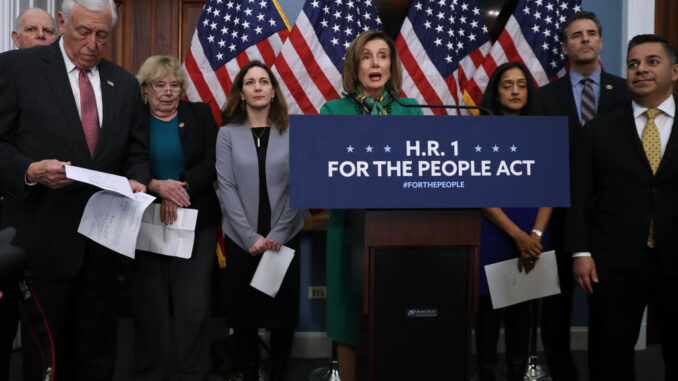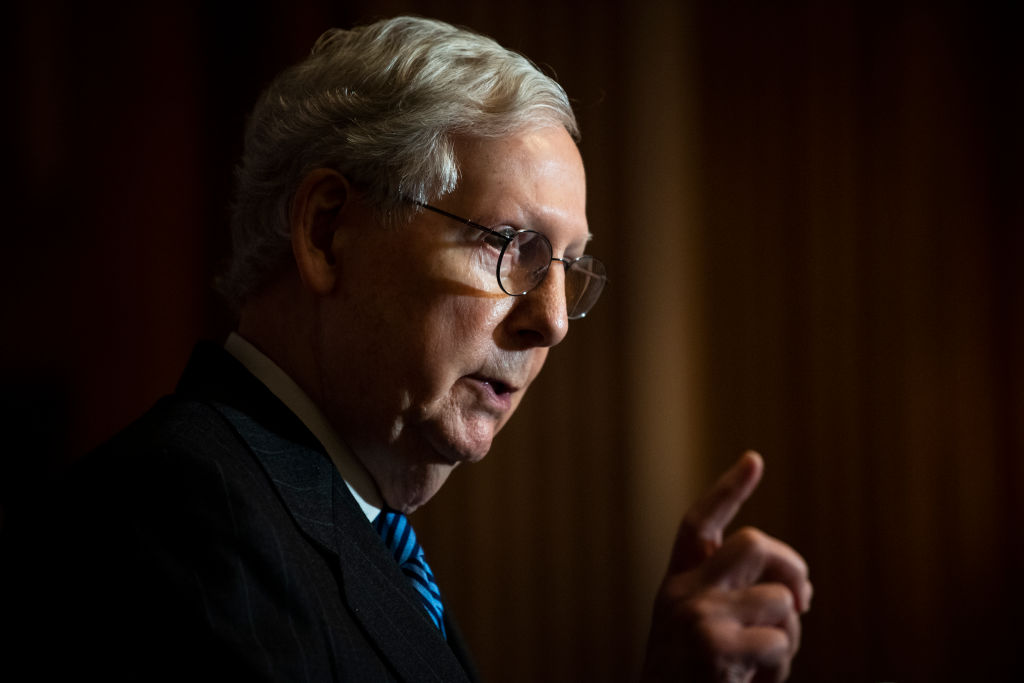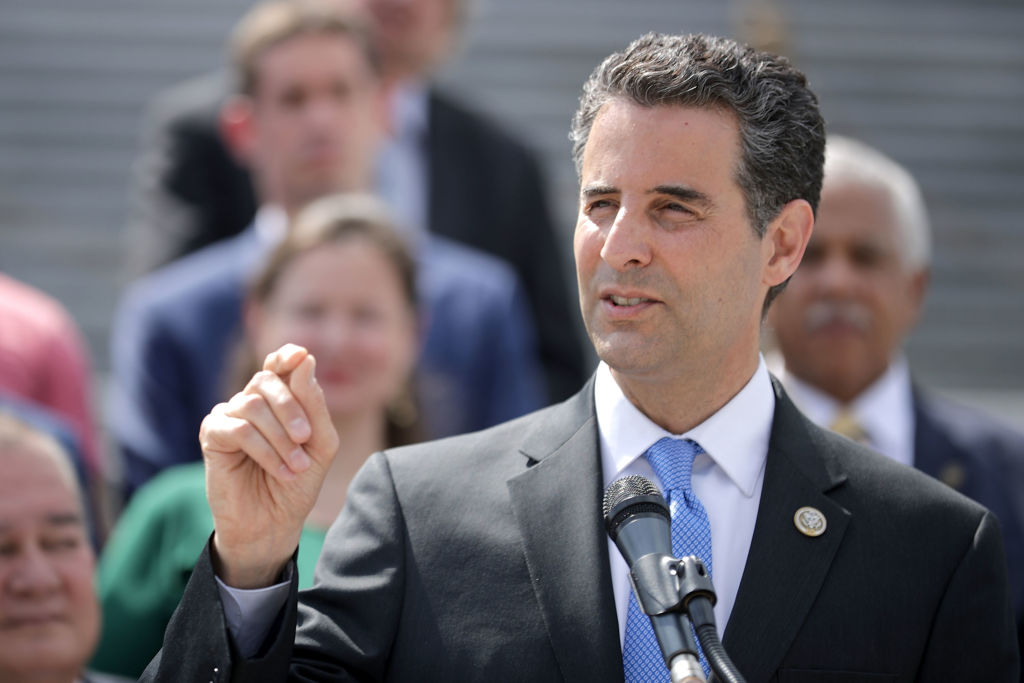
House Democrats want to make sweeping changes to campaign finance and election law, and that begins with H.R. 1, the “For The People Act.”
It passed in the House but languished in the GOP-controlled Senate in 2019 — this is round two.
Its return comes in the aftermath of a tumultuous 2020 presidential election, in which former President Donald J. Trump made numerous unsupported statements about voter manipulation.
“The bill contains the reforms we need to restore democracy,” said Daniel Weiner, deputy director of the Brennan Center’s Election Reform Program. He considers it a historic piece of election reform legislation he likens to the Voting Rights Act of 1965, which the bill references. “We strongly support this bill.”
H.R. 1 includes election, campaign finance, anti-corruption and voter registration measures. It also makes statehood for Washington, D.C. more attainable. In addition, it has provisions for presidents and vice presidents to reveal their taxes returns. Given that complexity, it has its critics.
The Conservative Action Project calls the bill a “fantasy of the left” and writes it would cause “damage to the free speech, privacy and integrity that are central components to free and fair elections in America.”
Senate Minority Leader Mitch McConnell (R-Ky.) called the bill a “political power grab” by Democrats when it came to the Senate in 2019. He prevented the bill from coming up for a vote.

“Those arguments are completely baseless,” said Weiner. He explained the core policies in the bill tend to find bipartisan favor in voter polling, and said he sees nothing in the bill that would benefit one party over the other. “It’s sad that voter access has become a partisan issue.”
Weiner sees the bill as a victory for both sides of the aisle.
“The reason this bill needs to be a top priority is because the proper functioning of our democracy affects pretty much every other issue that people care about,” he said. “You would see an election system in which everyone who is eligible has a meaningful opportunity to participate, and in which the priorities of ordinary voters on both the left and the right take more precedence over entrenched interests.”
Introduced in the House on Jan. 4 by Rep. John P. Sarbanes (D-Md.) and referred to committee, the bill has garnered 217 co-sponsors and is expected to come before the full House first, followed then by the Senate in the spring.
“H.R.1. , in many respects, it represented the coming together of a tremendous set of very robust reform proposals proposed over many, many years,” Rep. Sarbanes said in a video on his website. “We had to respond in a meaningful way to this undue influence that big money and corporations and other insiders have in Washington. So H.R. 1 is a direct product of what the American people have been telling us for years.”

“Throughout the country’s history, the best way to defend democracy is to strengthen democracy. S. 1 [the Senate has introduced the bill as well] would be the most significant democracy reform in more than half a century,” stated Michael Waldman, president of the Brennan Center for Justice at NYU Law, which helped develop its policies.
The bill increases voter access by promoting internet registration, allows for increased same-day voter registration and lists restrictions on voting by mail. It also increases early voting, allows convicted felons who have served their sentence to vote again, and makes Election Day a federal holiday.
“If you want to engage folks who don’t feel like they have a stake in the process, then you need to make it feel more accessible, and that’s what this bill does,” said Weiner.
The bill requires that donations over $10,000 to politically active nonprofits be publicly disclosed, as well as requiring disclaimers and increased transparency on online political ads. It would also put in place stricter rules for foreign lobbying and super PACs.
“In general, anything that raises the barrier to speaking about politics, whether it’s record-keeping or identity verification, is going to result in fewer people speaking about politics,” said Will Duffield, a policy analyst at the Cato Institute.
The disclosure and data collection involved will likely be helpful for journalists and for helping them and the public understand where messages come from, said Duffield. But he sees pitfalls, such as Facebook and other platforms determining what qualifies as political rhetoric.
He cites the Penzy’s Spices experience when trying to run anti-Trump ads for their spices on Facebook. They weren’t influencing policy or election results, but still needed to go through a private review because of their election-focused ad. Weiner doesn’t agree: “It just says that Penzey’s ad would go into a database, and that the public could look it up.” However, he does worry that expense ad pricing would favor incumbents.
To avoid the pitfalls, Duffield suggests legislators “keeping it to the old definition of electioneering communication — anything that advocates for or against or mentions a candidate for federal office — would make it both more limited in scope, but also more interpretable for these platforms.”
If passed, the bill would also establish limitations and disclosure rules on presidential inaugural committees, as well as require independent commissions to determine congressional district lines (for states with multiple congressional districts) in an attempt to thwart gerrymandering. The commissions would have 15 members divided equally among Democrats, Republicans and Independents. Each proposed district from the commission would have to earn both a majority vote and at least one vote from each respective party’s committee member.
In addition, the bill seeks to bolster ethics requirements by making the disclosure of 10 years of tax returns by all presidential and vice presidential candidates the law, and prevent congressional representatives from serving on corporate boards. The president and vice president would be required to disclose their tax returns while in office.
Releasing of such returns became a major controversy during the last administration, as Trump refused to disclose his tax returns throughout his campaign and term.
“Disclosure advances the core values of democracy,” said Weiner. “The bill makes it clear that transparency is free enhancing. It needs to be calibrated to ensure it doesn’t deter people from speaking, but the Supreme Court acknowledged in Citizens United, that transparency furthers our public discourse. I find [the argument that the bill will limit free speech] inconsistent with what the Supreme Court itself has said and adopted as the framework for thinking about these issues.”
It also proposes statehood for D.C. — this means the populated portion of D.C. excluding the National Mall, White House grounds, congressional buildings, and other federally owned portions of the mall.
“The bill interferes with the ability of states and their citizens to determine qualifications for voters, to ensure the accuracy of voter registration rolls, to secure the integrity of elections, to participate in the political process, and to determine the district boundary lines for electing their representatives,” The Heritage Foundation wrote in an update to its 2019 statement on the legislation.
The Brookings Institute has a more practical take: “Republican opposition to D.C. statehood rests in large part on politics. Given the overwhelming Democratic voting in Washington, it would be unlikely that Republicans would elect a House member or senator from D.C. As a metric, since 2000, the Democratic presidential nominee captured, on average, over 89% of the vote.”
Other bill supporters include including the Leadership Conference on Civil and Human Rights, a coalition of over 200 national organizations. Its statement had over 50 directly undersigned organizations, including the AFL-CIO, the NAACP, the Sierra Club, the Center for Constitutional Rights and the League of Women Voters.
The House has promised to pass H.R. 1 quickly, the expectation is it will leave committee and come to a floor vote and approval in March. It is a priority of Senate Majority Leader Sen. Chuck Schumer (D-N.Y.), but will need 60 votes to pass, which may be difficult to secure.
(Edited by Fern Siegel and Matthew B. Hall)
The post Reform Redux: Senate Could Bring Major Voting, Anti-Corruption Bill To Floor appeared first on Zenger News.
Recommended For You.



Be the first to comment